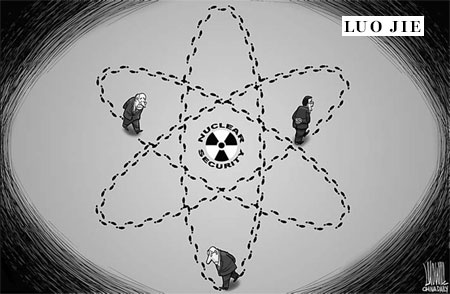Safer world, safer energy
Updated: 2012-03-27 14:23
By Zhai Dequan (China Daily)
|
||||||||

Seoul summit should seek to improve cooperation on nuclear materials and facilities security and promote nonproliferation
As a huge country for nuclear energy development, China has always attached great importance to nuclear security and fully supports the nuclear security and nonproliferation efforts of the international community. It hopes the second Nuclear Security Summit in Seoul will help improve the global security level of nuclear material and nuclear facilities and promote the sustainable development of nuclear energy.
President Hu Jintao will give a speech at the summit outlining China's nuclear policies and efforts in meeting its commitments agreed at the first summit in April 2010 in Washington, DC. The first summit laid a platform for 47 state leaders and representatives of international organizations such as the United Nations, the International Atomic Energy Agency and the European Union to reach consensus and share awareness that nuclear security is of paramount importance to the safety of mankind.
Nuclear security generally refers to the various measures adopted to deal with and prevent the intentional sabotage and/or stealing of nuclear materials and/or weapons. With the ultimate goal of a nuclear weapon-free world, nuclear security also includes arms control, disarmament and nonproliferation. However, the commitments made by various countries at the first summit were only "voluntary" and not legally binding.
The Seoul summit should strive to pave the way for establishing an international cooperative regime - with specific guidelines and rules - for international coordination on protecting nuclear materials and technologies. More states will make commitments to reduce fissile materials and propose stricter measures to improve nuclear security systems and prevent the illegal trafficking of nuclear materials.
This is a small, yet important step toward the goal of a nuclear weapon-free world. That final goal entails vertical endeavors - from UN General Assembly resolutions to limit and ban nuclear weapons, United Nations Security Council resolutions, shared norms of international law, national legislation and execution, to grassroots export and import control systems - and horizontal measures from all the UN member states, nuclear and nonnuclear, to criminalize the use of nuclear weapons, to freeze and eliminate nuclear weapon arsenals, and to engage in arms control, disarmament and nonproliferation.
The Nuclear Non-proliferation Treaty should be observed both to the letter and in spirit; that is to say, the nuclear weapon states should not use or threaten to use nuclear weapons against nuclear and nonnuclear weapon states and nuclear weapon-free zones; lower the role of nuclear weapons in their strategic planning; cut their nuclear arsenals and not proliferate. The nonnuclear weapon states should not try to develop or possess nuclear weapons, but enjoy the privilege of peaceful use of nuclear energy.
In this process, the only qualified actors to play the leading role are the United States and Russia. Beyond their actual nuclear security and nuclear disarmament policies, they should demonstrate a spirit of peaceful coexistence and accommodate different cultures, ideologies, values and religions, instead of promoting war-mongering policies and harboring a sense of superiority.
In a seminar some weeks ago, an international NGO presented to the China Arms Control and Disarmament Association an index, showing the nuclear security situation of various countries. Obviously, that information was collected to serve as reference material for the Nuclear Security Summit in Seoul.
In the index, China's nuclear security was rated 10th. Looking into the details, we found much ignorance about China. One example was the index claimed nuclear materials were transported unguarded and unprotected. That is not only misleading, it is absurd. There were similar wrong instances in the index.
We voiced strong objections and provided corrections immediately. I hope such misleading information will not re-appear and be disseminated at the summit in Seoul as it will hinder efforts to further improve international consensus and promote international cooperation on nuclear security.
All participants should make concerted efforts to ensure global nuclear security and promote the sustainable and peaceful use of nuclear energy.
The author is deputy secretary of China Arms Control and Disarmament Association.

 Relief reaches isolated village
Relief reaches isolated village
 Rainfall poses new threats to quake-hit region
Rainfall poses new threats to quake-hit region
 Funerals begin for Boston bombing victims
Funerals begin for Boston bombing victims
 Quake takeaway from China's Air Force
Quake takeaway from China's Air Force
 Obama celebrates young inventors at science fair
Obama celebrates young inventors at science fair
 Earth Day marked around the world
Earth Day marked around the world
 Volunteer team helping students find sense of normalcy
Volunteer team helping students find sense of normalcy
 Ethnic groups quick to join rescue efforts
Ethnic groups quick to join rescue efforts
Most Viewed
Editor's Picks

|

|

|

|

|

|
Today's Top News
Health new priority for quake zone
Xi meets US top military officer
Japan's boats driven out of Diaoyu
China mulls online shopping legislation
Bird flu death toll rises to 22
Putin appoints new ambassador to China
Japanese ships blocked from Diaoyu Islands
Inspired by Guan, more Chinese pick up golf
US Weekly

|

|






